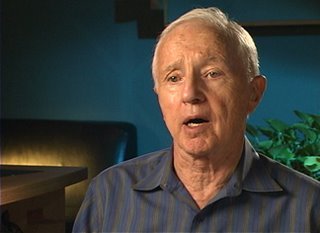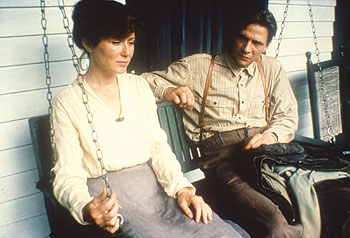Friday, August 25, 2006
From the Vault: Haskell Wexler
This interview with Oscar-winning director of photography and director Haskell Wexler was originally published in two parts in 1990.

When Haskell Wexler answered question from a crowd of about 100 people following a screening of his film Medium Cool, he relayed a story about his days as a merchant seaman. He told how he used to annoy colleagues with his views of how he'd change the world to which they'd respond, "What do you know about changing the world? You can't even tie a bolo."
Wexler used this story as a metaphor about professionalism, which he called "the disease of our times." Wexler worries that because of this "disease," film schools have turned into "vocational school on how to adapt to the system."
"It's important to know what to do with your art, not how to do it," Wexler said, making the point that would-be filmmakers need to decide if they want their work to be "pure" as intended to a smaller audience or to make a hit based on viewer response.
He spoke about Dead Poets Society, which he said was "good, but not great" but did attempt to say something about life, ideal and art.
"It helps that it made money. Each one that makes money makes another film like it easier to make."

Wexler blamed many of the problems on the corporate system of Hollywood, though he did say that any artist can persevere if he "pushes the limits of his artistic control."
In that general area, he point to the double standard in censorship attempts and the recent ratings controversy over The Cook, the Thief, His Wife and Her Lover and Wild Orchid.
The MPAA threatened both films with X ratings but Orchid was re-cut to receive an R and Cook went out unrated.
"Smart people are destroying the world everyday and that's not obscene but you say fuck and it is dirty, obscene and awful."
As far as films themselves, Wexler pointed to Driving Miss Daisy as his favorite film of last year because of its "humanity" and "quietness." As for personal influences, Wexler cited Jean-Luc Godard as having a major effect on his style as a director. He also named the late Hal Ashby, whom Wexler worked with on Bound for Glory and Coming Home, as the best director he ever worked for.
"At his best, Hal was extremely creative and socially aware."
He also defended Oliver Stone, the Oscar-winning director of Born on the Fourth of July, who has received criticism for scenes in the biopic that didn't really happen. Stone claimed he used "creative license to tell a bigger truth."
"I know Ron Kovic and I read the book and the film is in essence true, if not in specifics...the feeling for the time is very accurate."
Most recently, Wexler worked on The Two Jakes, the long-awaited sequel to Chinatown as a favor to director/star Jack Nicholson, whose original cinematographer had to leave to fulfill a prior commitment on Brian De Palma's The Bonfire of the Vanities.

Haskell Wexler won Oscars for cinematography for Who's Afraid of Virginia Woolf? and Bound for Glory. He also has worked as a director on politically charged documentaries and fiction films such as Medium Cool and Latino.
Wexler began working as a d.p. in features in 1958 with Stakeout on Dope Street, the directing debut of Irvin Kershner (The Empire Strikes Back).
Most recently, he received an Oscar nomination and won the American Society of Cinematographers' award for Blaze.
"I was so afraid that I would win this year because I had absolutely no idea what to say. I was so relieved when Freddie (Francis, d.p. on Glory) won."
Wexler said that, in addition to the positive results an Oscar can bring, it also gets the winner calls from people they haven't heard from in years seeking help or money.
The director of photography is responsible for the recorded image a film presents. The d.p. is "the director's right hand," helping with composition, camera movement and location in addition to managing the technical crews from electricians to grips.
Wexler, being one of the top cinematographers in the business, gets his pick of projects, though restlessness and the need for his crew to work often become a factor. As a d.p., Wexler receives an asking price of $12,000 a week plus expenses for a five-day week, far below what actors, directors and screenwriters earn for their work in the collaborative medium.
As far as personal satisfaction with his work, Wexler cited Elia Kazan's 1963 black-and-white America, America as the film in which he's proudest of its look, followed by 1987's Matewan, the John Sayles' movie which Wexler proudly wore a jacket from during his trip here.
Wexler spoke of his concern about the "100 percent film student" who knows no difference between the real world and what's on the screen.
"It's very secure to have your world history on video...if you think people smoke, drink and make love or dress the way they do in films, you have a problem."
Tweet
Labels: Ashby, De Palma, Godard, Interview, Kazan, Nicholson, Oliver Stone, Oscars, Sayles, Wexler
Comments:
<< Home
Medium Cool describes my reaction to said film. I saw it a couple of years ago and it left no impression on me whatsoever.
On the other hand, I love love love Two Lane Blacktop. Go figure.
Post a Comment
On the other hand, I love love love Two Lane Blacktop. Go figure.
<< Home

